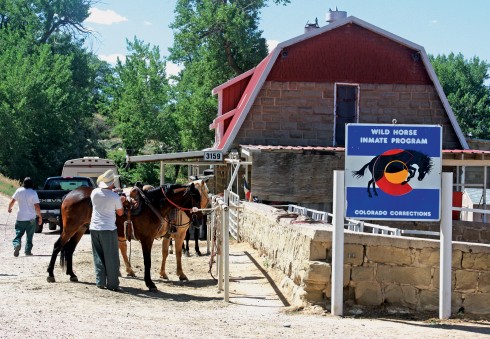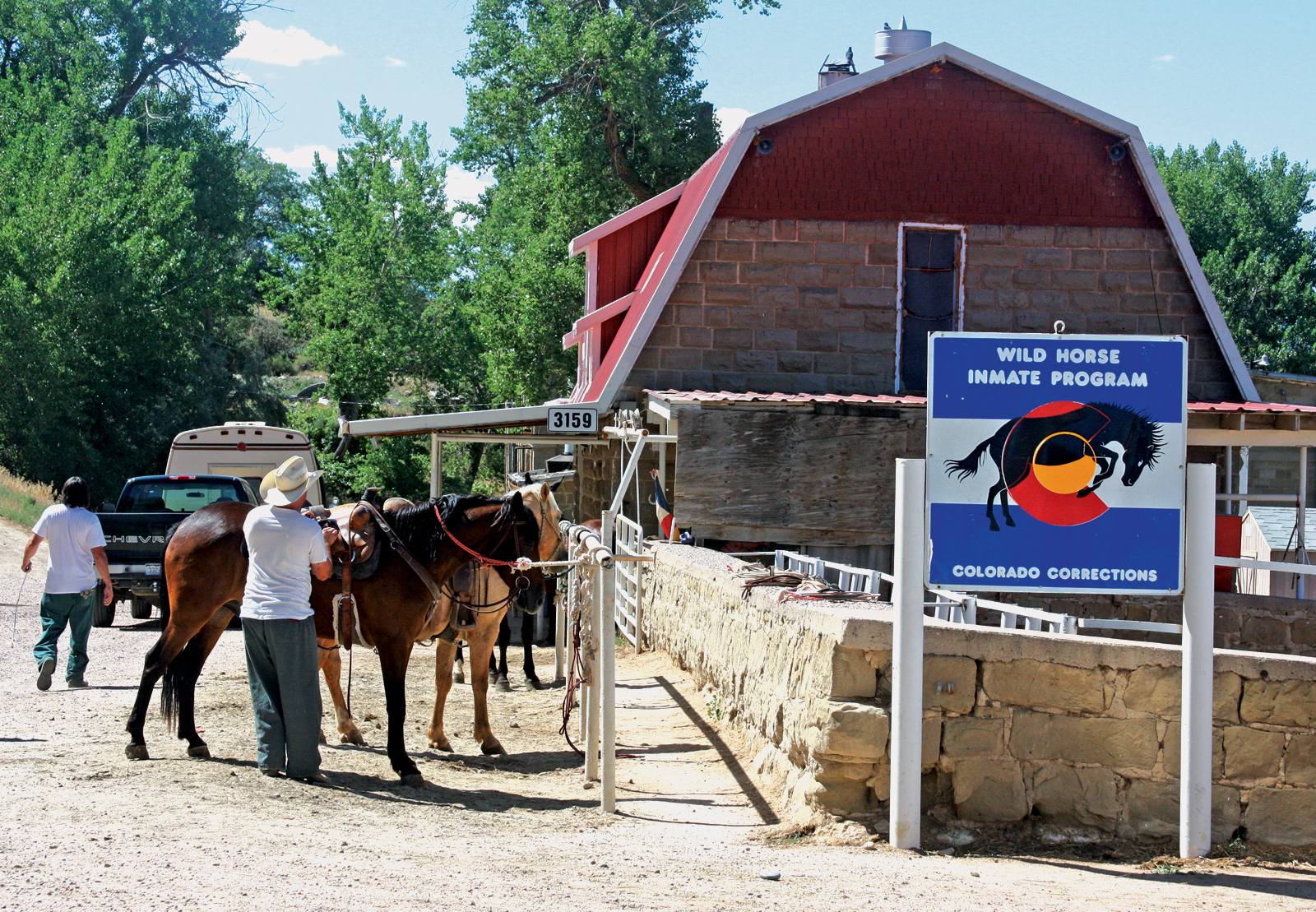Story and photos by Mike Rosso
It is one of the largest agricultural operations in Colorado, encompassing nearly 6,000 acres. It includes a goat dairy, corn fields, vineyards, floral greenhouses, cow dairy, tilapia fish farms, composting operation, a wild horse training program, and it is all located in Fremont County, just outside Cañon City.
Most of the workers are paid just a few dollars a day but gladly take on the physical tasks with few complaints. That is because the workers are all inmates, serving out sentences at the Colorado State Correction facilities and their employer is Colorado Correctional Industries (CCI), a for-profit division of the state prison system.
What started out as a dairy operation to help keep idle hands busy while incarcerated has grown into a program that is the envy of prison systems around the U.S. and is becoming a model for prisons around the world. A legislative bill, CRS 17-24-101, passed in 1977, created the Division of Colorado Correctional Industries within the Department of Corrections to create job training and self-improvement opportunities for inmates.
Low-risk inmates are given the opportunity to work at any number of trades at the facility which may help them become more employable upon release, as well as help them gain an appreciation of hard work and the satisfaction of producing something tangible. Working with other inmates also helps inmates develop better social skills, which assists in their incorporation into society, according to Steve Smith, Director of CCI.
CCI has a presence in 17 of 23 prisons statewide and it has been estimated that every inmate who works within the CCI system saves the state nearly $5,000 in reduced custody costs including supervision and programming.
Studies have also found that the recidivism rate drops considerably for those who have worked in the programs, according to Smith. Inmates not participating in the CCI programs return to prison at a rate of 55.2% whereas inmates participating in the program show a 34.5% return rate. He says there are approximately 2,000 inmates participating in the program statewide, and emphasized that it is a self-sustaining program, using no taxpayer dollars, instead relying on profits from the products they manufacture and grow to maintain and expand the program. All revenues earned by the various programs are reinvested.
Since his tenure as Ag Division manager, Smith has been instrumental in starting the K9 program, fisheries (both raising and processing fish), the goat dairy, pheasant farm, the Farm Labor program and the expansions of the Wild Horse Program, and vineyards. He was Ag Division manager from 2003 – 2007 before being promoting to Director.
Since the women’s correctional facility in Cañon City was closed recently due to statewide budget restraints, the ag and manufacturing programs are worked exclusively by men, but there are some women employed by the program who work in training and supervisory positions. Smith said women in other state facilities often work as farm laborers at private farms.
The Fishery
In operation since 2001, the tilapia operation has been one of the fastest growing of all the programs. Tilapia, a fresh water fish, is raised and processed on the premises and is certified organic. Tilapia is becoming more popular for production due to its size, rapid growth and palatability. They are also a good source of protein and much of the product is wholesaled to natural foods retailers. At the Cañon City facility they produce nearly one million pounds annually. The fish is farmed from egg to maturity and is gutted, filleted, packaged and shipped from the facility. The Cañon City facility also processes and smokes trout that are reared at the Buena Vista Correctional Facility. Two trucks per week transport the trout from Buena Vista downriver to the facility where they are smoked, packaged and shipped.
CCI has also just begun a fresh-water shrimp farming operation which they hope to have in production mode by 2011. The timing of the new shrimp operation could help fill the market gap left by the devastating oil spill in the Gulf of Mexico which is estimated to have severe and long-term effects on the shrimping industry in that part of the country.
Goat and Cow Dairies
With nearly 1,800 head of Holsteins, the CCI dairy is one of the largest in the state and provides milk for the state prison system as well as to retailers. It was begun in the early 1900s. 850 cows are milked three times daily. The goat dairy was started in 2005 and has grown to 2,500 total goats milking 1,400 twice a day which is sold to cheese manufacturers in the state, including the Jumpin’ Good Goat Dairy in Buena Vista.
Greenhouses
Greenhouses on the premises grow everything from cut flowers to dry-climate landscape shrubs, such as Russian sage and Catmint. They also grow bog plants, roses, and run a floral arrangement and packaging operation which includes hand-painted flower pots, although Smith isn’t sure how long they will maintain the decorative flower operation. “There’s not as much money in flowers as in fish,” he revealed with a grin.
Vineyards
The climate and soil at the facility is excellent for growing wine grapes, and in 2002 CCI began planting and harvesting a variety of grapes including Concord, Riesling from the Rhine region of Germany, Chardonnay from eastern France, and Viognier from the Rhone Valley in France. The grapes are currently sold to the Abbey Winery in Cañon City.
Wild Horse Program
CCI is the largest vendor for the BLM’s wild horse program, which involves inmates breaking wild horses so they can be sold to individuals and agencies. The process under saddle takes about 90 days, and when we visited, many horses were getting ready to be shipped to the U.S. Border Patrol. A public auction is held weekly by the BLM at the East Canon Prison Complex, and a public adoption for unbroken horses takes place every Friday at a cost of $125 per horse. Inmates care for an average of 3,000 horses every day. Rural inmates are discouraged from entering the program, as they often have preconceived ideas of how to break a horse. Smith said the trainers prefer inmates from urban areas who have no experience with horses and who themselves are learning brand new skills in an unfamiliar environment.
Prison-Trained Companion K-9 Program
Problem and hard-to-adopt dogs are gathered from pounds and shelters along the Front Range and around the state to be domestically trained by inmates in the companion program started in 2002. Most are eventually placed in carriers in the cells of inmates for one-on-one training for a period of time. This helps both the inmate and the dog develop good social skills. Untrainable dogs are not euthanized, but put to work as guard dogs at the facility. Inmates also train service dogs at the facility and offer a boarding-in training program for privately owned dogs, providing the same training as their adoption dogs.
More info and photos of dogs currently available for adoption can be found at: www.coloradoci.com/serviceproviders/puppy/index.html?intro
Compost
Compost is also created at the facility using horse and cow manure as well as fish guts, all mixed with straw and aged. The compost is purchased by wholesalers who buy it by the semi-load and repackage it. Compost is also available at the facility by the yard by appointment.
Custom Fishing Rods and Flies
According to Smith, in recent years an inmate brought his custom fishing rod skills into the program and it was decided to incorporate a fly tying and custom rod building operation into the venture. Begun in 2008, the rod shop at the East Canon Correctional Complex currently makes custom bamboo and composite rods with detailed inlay and traditional craftsmanship. The flies and rods are available to the public by contacting the correction complex at 719-269-5764.
Apple Orchards
Apples are grown and sold on the open market, as well as to the Department of Corrections.
Honey
A bee farm and honey operation has been in place since 2005 and makes honey available to inmates and DOC staff.
Pheasant
The delectable game birds are being raised at the prison but there is yet a processing facility for them.
In addition to its agricultural programs and training programs, CCI also has a recycling program, a manufacturing division that includes office furniture, saddles (at the Buena Vista facility), pallet construction and restoration, printing services, signs and, of course, license plates.
Additional information on most of the programs mentioned above can be found online at:

